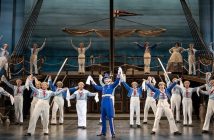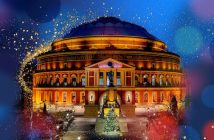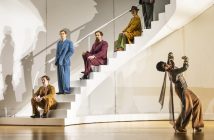I love Opera Holland Park. Let’s get that out of the way up front. The experience they create every summer is one of the real triumphs of London’s arts scene. Their programming is especially worth a mention – yes you’ll see some crowd pleasers, but you’ll also get the chance to see a piece you’ve probably never seen before. Zazàis the perfect example. Its composer, Leoncavallo, is well known thanks to I Pagliaci, but Zazà isn’t a work you’re likely to have seen on stage. Which begs the question why not? Is it, in fact, a bit of a dud? (Spoiler alert – than answer is no).
Zazà had its première in Milan in 1900, the same year as Tosca. But it’s Puccini’s La bohème that acts as a better point of comparison. Incidentally, Leoncavallo wrote a bohème of his own, just three years before Zazà, but it’s Puccini’s version that stood the test of time. Their shape and dynamic are similar – both have four short acts and begin with bustle, action and comedy, before a shift towards intimacy and tragedy.

It’s this shift that really holds Zazà power. It’s not the first opera of its style (or period) to feel distinctly like a game of two halves (see our review of Manon Lescaut for more on that). In fact La bohème (Puccini’s, that is) is perhaps a rarity, in that the lively comedy of its opening scenes is as strong as the drama that follows. You could almost be forgiven for dismissing the first twenty minutes or so of Zazà as nothing more than a procession of characters traipsing in, telling us who they are and letting us know their back story.
Almost, but not quite. There are several strong moments, thanks in large part to some great pacing and equally good acting. This gets us through the bulk of the first two acts, despite there not being a huge amount of dramatic tension. But, as soon as the action shifts to intimacy in the third act, things really take off. From then on it’s a thrilling piece of theatre.

Zaza’s journey, from careless, almost callous diva to compassionate, touching heroine is sublime. The cast is uniformly excellent, there’s not a dramatically weak link to be seen. But it’s Anne Sophie Duprels’ Zaza who burns brightest. It’s an extraordinary performance, raw and compelling. The scene in Paris between Zaza and her lover’s child, and the full force of her decision not to condemn a child to the same upbringing she herself had, is wonderful. We feel her struggle as she chooses not to let history repeat itself and condemns herself to loneliness in the process. The final image of her illuminated and alone reminds us that, ultimately, we all face the world on our own, however adored we are.
Is Zazà the best example of Italian opera of its period? Definitely not. Does it deserve to be seen far more regularly than it is? Absolutely. Hopefully history won’t repeat itself and we’ll see Zazà back on stage in London before too long.
Zazà at Opera Holland Park until 29th July 2017. Production images by Robert Workman. For more information and tickets please visit the website.




